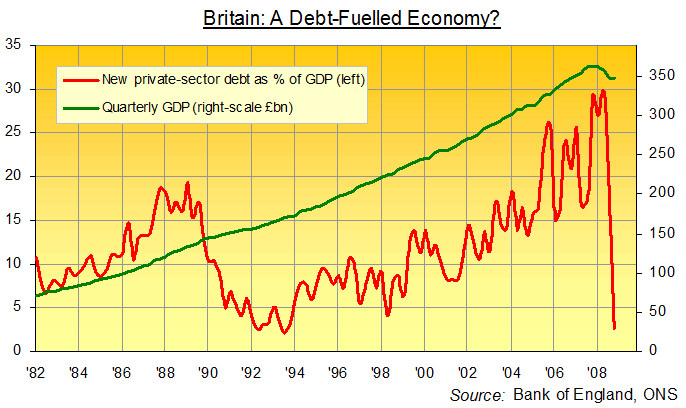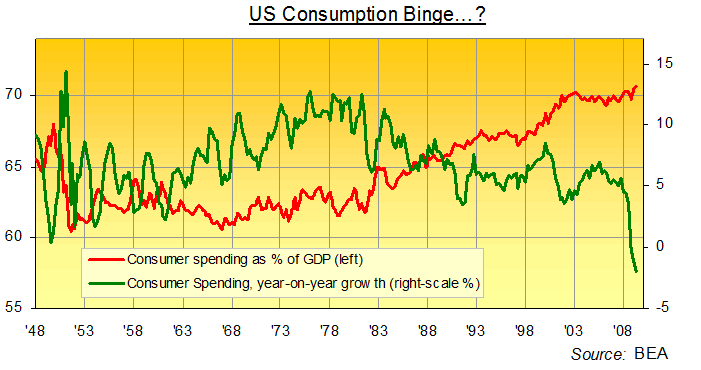Debt is Economic Dark Matter
Economics / Economic Stimulus Sep 23, 2009 - 03:17 PM GMTBy: Adrian_Ash
 "A debt bubble, yes. But a consumption binge...?"
"A debt bubble, yes. But a consumption binge...?"
IT'S A COMMON-PLACE of political, investment and bar-room debate that the Anglo-Saxon economies enjoyed a debt-fuelled consumer boom over the last decade or so.
In fact, it's a given...the one sure thing any analysis builds on, whether it's begging for votes, fund-management fees or a shared cab-ride home. The US and UK piled more debt on household balance-sheets than any other nations in history, forgetting to add a balancing item beyond the apparent value of the roof over their heads.
Thing is, the data don't support it. Worse yet, they don't deny it either. Anglo-Saxony took on a record volume of household debt, simply to keep household spending growing on trend. Something ugly but hidden – economic dark matter – forced consumers deep into hock just to keep pace during the early 21st century.

The UK, for instance, added 30 pence of new private debt for every £1 of output at the very top of the bubble.
Not merely 30p for every extra pound. (New debt to growth averaged 4:1 from 2000 to mid-2008). No, private debt-growth peaked at equivalent to 30% of GDP full-stop, accelerating by more than one-sixth each year from the turn of the decade.
Yet household consumption failed to leap higher in tandem, remaining "on trend" from the previous four decades and growing in lock-step with total activity. The extra credit and debt must have gone on funding something else entirely.

Across the Atlantic, the same story, albeit with different data.
Personal consumption, as a proportion of GDP, broke sharply higher in the last years of last century. It stayed there too, equivalent to 70% of the annual economy, despite flagging in terms of year-on-year growth – and despite increasing in lock-step with GDP across the 10 years to end-2007.
Clearly something's wrong with the maths, but where it's broken the data won't say. It didn't add up five years ago either, back when then-Bank of England policy-maker Stephen Nickel spotted the puzzle...only to dismiss it. Nickel noted the huge leap in UK house prices in terms of income multiples (from the near-record four times salary then, they had another three multiples to go before peaking), but he guessed that "debt accumulation" by one family buying a home typically meant "financial asset accumulation" for the seller, using the proceeds to buy shares or bonds. Thus all was for the best in the best of all debt-driven worlds. Net-net, we were borrowing ourselves richer.
Fixing the worst slump since the Thirties thus comes down, or so everyone assumes, to either reversing a course that never took place...and forcing a reduction in consumption that enables households to reduce debt...or reviving a fresh (meaning first) surge in consumer spending with sub-zero interest rates and tax-funded cash incentives.
The likely outcome, we guess here at BullionVault, is both or neither. More urgent for investors and savers, let alone policy pooh-bahs, is identifying quite what the historic burden of debt that households now carry actually financed.
By Adrian Ash
BullionVault.com
Gold price chart, no delay | Free Report: 5 Myths of the Gold Market
City correspondent for The Daily Reckoning in London and a regular contributor to MoneyWeek magazine, Adrian Ash is the editor of Gold News and head of research at www.BullionVault.com , giving you direct access to investment gold, vaulted in Zurich , on $3 spreads and 0.8% dealing fees.
(c) BullionVault 2009
Please Note: This article is to inform your thinking, not lead it. Only you can decide the best place for your money, and any decision you make will put your money at risk. Information or data included here may have already been overtaken by events – and must be verified elsewhere – should you choose to act on it.
Adrian Ash Archive |
© 2005-2022 http://www.MarketOracle.co.uk - The Market Oracle is a FREE Daily Financial Markets Analysis & Forecasting online publication.



